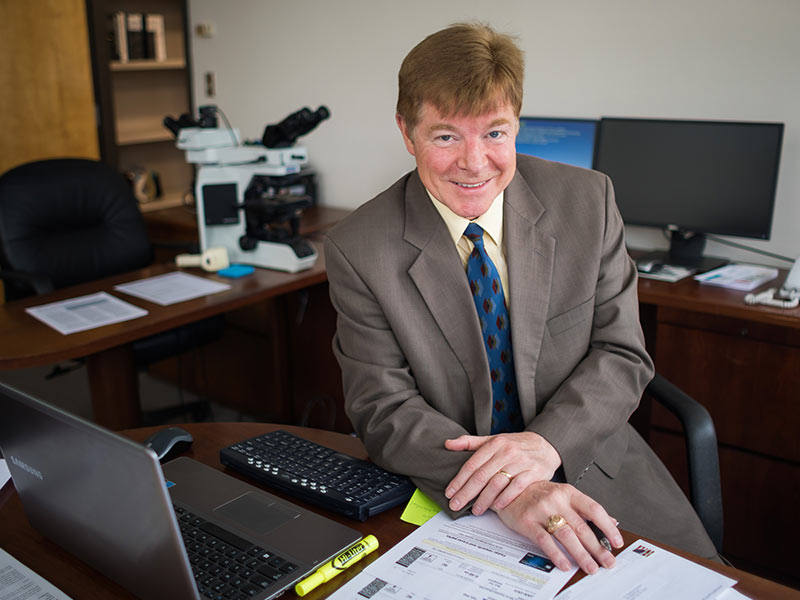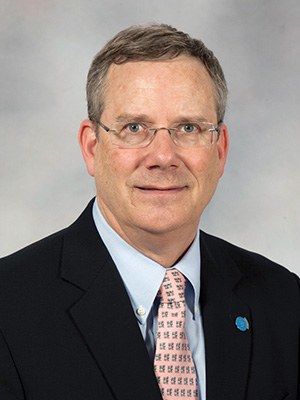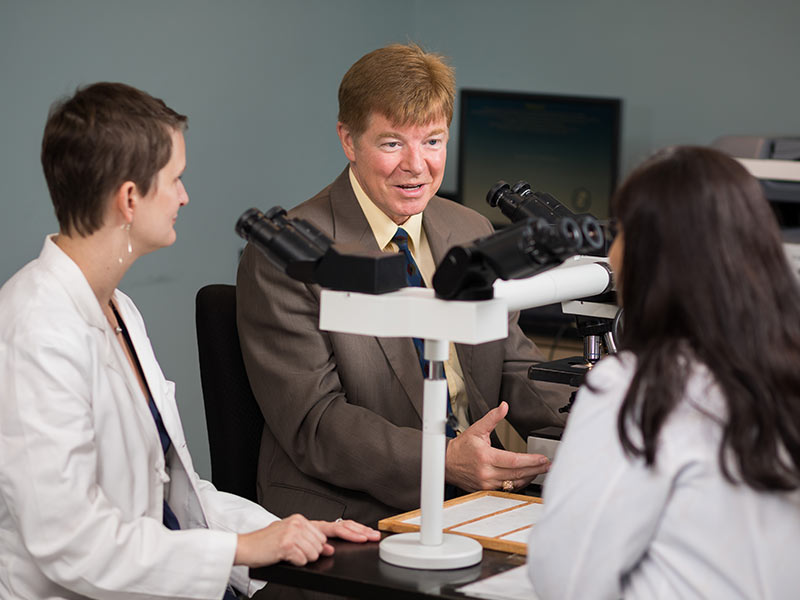New pathology chair values lessons learned from medicine, law, family

Whenever Dr. Timothy Allen wonders if he’s making a difference, if his work means anything, he remembers his father.
When Allen was 7, one of his dad’s pupils was a sixth-grader he was tutoring in math – a boy who had struggled to do his best, but was failing. “The last I heard of him he was going on to middle school,” Allen said.
One evening years later, his father answered the phone and spoke for about an hour with the caller – that same boy was about to graduate from Texas A&M with honors, and he wanted to tell Allen’s dad “thank you.”
“So, can you impact someone?” Allen said. “That call told me all I needed to know.”
That memory has informed and inspired Allen’s work as an educator and will continue to do so in his new position as chair of pathology at the Medical Center, he said.
He joined the faculty in January, arriving from Galveston and the University of Texas Medical Branch, where he was professor of pathology as well as director of anatomic pathology and interim director of surgical pathology.
The Paris, Texas, native has moved to a home in Jackson with his wife Fran; they have two daughters: Caitlin, a senior majoring in industrial distribution engineering, and Erin, a junior studying nuclear engineering, both at his undergraduate alma mater, Texas A&M.
He brought to UMMC a medical degree from Baylor, a law degree from the University of Chicago and a demonstrative faith in the power of teaching from his parents, succeeding interim chair Dr. Robert T. Brodell.

“Tim Allen, over the last several months, advised me during my tenure as interim chair,” said Brodell, professor and chair of dermatology at UMMC. “He has broad experience in pathology, creative ideas, and good, old-fashioned common sense.”
Still, when it comes to his specialty, Allen believes he has some good, old-fashioned explaining to do.
When you hear the term “pathologist,” he said, you might picture Dr. Donald “Ducky” Mallard; you might think of a medical examiner who solves high-profile crimes on the TV shows like “NCIS.”
“That’s OK,” Allen said, “but one of my goals is to teach pathology more fully, because people still don’t really know who we are.”
A pathologist, he said, “is your physician who diagnoses your disease and who makes sure lab testing for diseases is done accurately and safely.”
Noted pathologists have been Nobel laureates. They have developed the modern IV drip technique; identified a bacterium that causes diphtheria; transformed the treatment of fungus diseases in crops; pioneered the study of antibiotic resistance in bacteria; and, yes, helped solve high-profile crimes.
Allen himself worked as a deputy medical examiner in Galveston County, Texas. There, physicians from around his home state sent him some of their tougher cases, relying on his expertise as a medical gumshoe.
In fact, the “idea of solving a mystery, of being a detective,” persuaded him to change his specialty focus from obstetrics-gynecology, he said. “I liked OB-GYN, but everything about pathology was new and challenging to me.”
Allen has met pathology’s challenges as the first physician in his family, although his brother, Danny Allen, is a board-certified nuclear pharmacist and president of a nuclear medicine company.
Their parents are Oliver Allen, now deceased, and Mildred Allen, who lives in Tyler, Texas, near Danny. Both parents were school teachers who taught their two sons “the value of education and knowledge, and to strive for them,” Allen said.
It was a lesson Timothy Allen didn’t fully understand at first, he said, in spite of the memory about his father’s work as a tutor. “I was not sure what I was fully capable of, but I had some teachers who expected more of me than I expected of myself; they were big influences in my life.
“They taught me to work as hard as one can to do well. I never forgot this concept. I had to prove they were right, and that kept me going.”
At Texas A&M, he confirmed their confidence in him in the classroom and as a member of the “Voice of Aggieland,” the Singing Cadets, adding his bass vocals to the elite, all-male chorus.
“I miss it,” Allen said. “Now I sing only in the shower.”
While at A&M, his studies were packed not only with pre-med, but also with history, political science, English and more. “All of it, I believe, makes me a better doctor,” Allen said.
After medical school and his residency at Baylor, he served as an assistant professor of pathology at his medical alma mater for five years before tackling law school. He hoped to merge his knowledge of medicine and the law and affect health care policy, he said.
“But I finally decided that to do so, you need to go into politics.”
Still, before taking on a pulmonary pathology fellowship at Baylor, he practiced law in Houston.

Today, his legal education continues to serve him well, said Allen, who keeps his Texas law license current, stays abreast of legal precedent and gives talks on medical ethics.
“In law school, I was taught how to think about things differently, critically questioning issues as my professors did,” he said. “Any physician needs to understand the legal issues, the ethical issues. We not only need to understand them; we also need to inform them.
“I approach issues with a different eye than I would have if I had only practiced medicine. As physicians, we have to know how to evaluate and handle risk.”
His mentor, Dr. Philip Cagle, saw Allen’s ability to do just that during an issue involving frozen section pathology labs, where testing is done on tissues transferred directly from an operating room in order to give surgeons valuable clues on how to proceed.
“Dr. Allen rolled up his sleeves and traveled to adjacent counties to cover the sections himself when scheduled faculty were unexpectedly absent from work,” said Cagle, professor of pathology and genomic medicine, Houston Methodist Hospital at Texas Medical Center.
“As director of anatomic pathology, he didn’t have to do that, but he volunteered rather than risk patient care or stretch medical staff too thin. He did it so that no one under him was overly burdened.”
Allen was also a member of the faculty at the University of Texas Health Science Center at Tyler before continuing his career at UTMB in Galveston.
In the entire University of Texas system said Dr. Victor Prieto, there are many campuses and many separate pathology departments, but under Allen’s watch, collaboration among them only grew.
“Dr. Allen has the vision to define a problem, find a solution and follow up,” said Prieto, chair of pathology at the University of Texas MD Anderson Cancer Center, which is part of the UT system and collaborates with UTMB.
“I’m sorry he left here to go to [UMMC],” Prieto said, “but I know the position is a step up for him, and I congratulate him.”
He came to Mississippi, in part, Allen said, because its needs are similar to those in certain places in Texas.
“The position here sounded attractive and I explored it. I would like the department to be known beyond the state, to have a national reputation. We have good people to do that,” said Allen, whose own reputation is expansive: He is a diplomat of the American Board of Pathology, the College of American Pathologists and the American Society for Clinical Pathology.
“I’ve built my own career,” Allen said, “now it’s time to help others build theirs, take care of my own team, even as one would one’s own family.”
It was his own family that taught him the defining lesson of his life: “The power of not giving up on anyone. People didn’t give up on me.”

